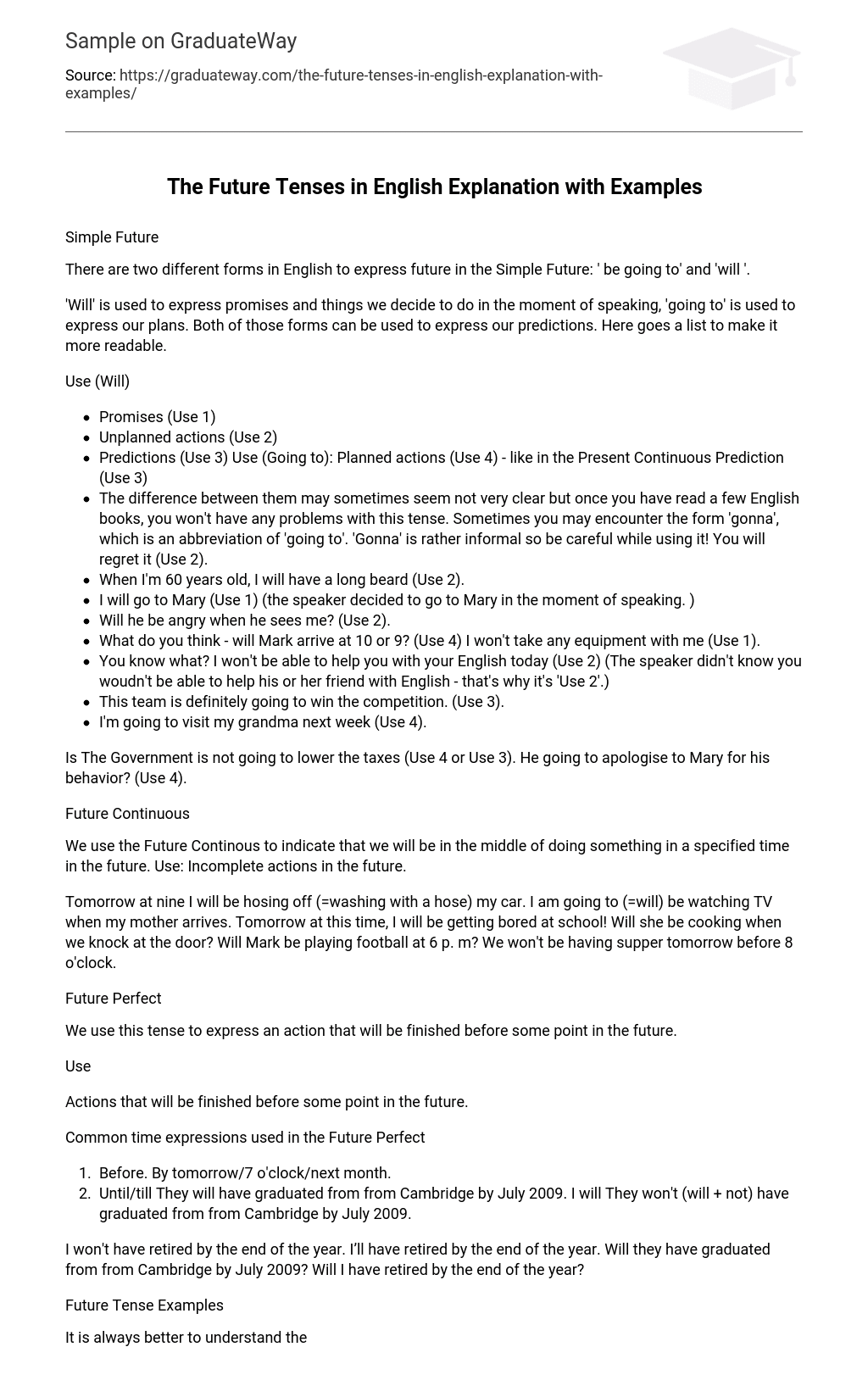Simple Future
There are two forms in English to express future in the Simple Future: ‘be going to’ and ‘will’.
The verb ‘will’ is utilized to express promises and instantaneous decisions. On the other hand, the phrase ‘going to’ is used to express plans. Both forms can be employed for predicting future events. The following list provides a clearer overview:
Use (Will)
- Promises (Use 1)
- Unplanned actions (Use 2)
- Predictions (Use 3) Use (Going to): Planned actions (Use 4) – like in the Present Continuous Prediction (Use 3)
- The difference between them may sometimes seem not very clear but once you have read a few English books, you won’t have any problems with this tense. Sometimes you may encounter the form ‘gonna’, which is an abbreviation of ‘going to’. ‘Gonna’ is rather informal so be careful while using it! You will regret it (Use 2).
- When I’m 60 years old, I will have a long beard (Use 2).
- I will go to Mary (Use 1) (the speaker decided to go to Mary in the moment of speaking. )
- Will he be angry when he sees me? (Use 2).
- What do you think – will Mark arrive at 10 or 9? (Use 4) I won’t take any equipment with me (Use 1).
- You know what? I won’t be able to help you with your English today (Use 2) (The speaker didn’t know you woudn’t be able to help his or her friend with English – that’s why it’s ‘Use 2’.)
- This team is definitely going to win the competition. (Use 3).
- I’m going to visit my grandma next week (Use 4).
Is the Government not going to lower the taxes? Use 4. Is he going to apologise to Mary for his behavior? Use 4.
Future Continuous
The Future Continuous is used to indicate that a specified action will be ongoing in the future. It is used for actions that will not be completed at the specified time.
Tomorrow at nine, I will be using a hose to wash my car. Meanwhile, I will be watching TV until my mother arrives. By this time tomorrow, I will be feeling bored at school. I wonder if she will be cooking when we knock on the door. Is Mark planning to play football at 6 p.m? We do not plan on having dinner before 8 o’clock tomorrow.
Future Perfect
This particular tense is utilized to convey an action that will be completed prior to a certain point in the future.
Use
Actions that will be completed before a certain future point.
Common time expressions used in the Future Perfect
- Before. By tomorrow/7 o’clock/next month.
- Until/till They will have graduated from from Cambridge by July 2009. I will They won’t (will + not) have graduated from from Cambridge by July 2009.
I will not have retired by the end of the year, but I will have retired by the end of the year. Will they have graduated from Cambridge by July 2009? Will I have retired by the end of the year?
Future Tense Examples
By exploring examples, it is always better to comprehend grammar rules. Examining how theory is applied in everyday life will help eliminate confusion.
If you need more detailed examples for each of the tenses, we recommend studying the following sentences. The future simple tense is commonly used and can be used to make promises, such as “I’ll pick you up after work tomorrow.” It is also used for recently made decisions, like “It is starting to be cold inside, I’ll close the window.”
The ‘be going to’ construction is used for indicating plans and predictions. For instance, “The sky is dark, and the wind is cold – it is going to rain.” Another example would be “I am going to visit my mother over the weekend, and we are going to continue decorating her house.”
In contrast, the future continuous tense emphasizes the duration of an ongoing action in the future. An illustration of this is “This time next week, I will be walking along the beach with my partner, and we will be enjoying the soothing sound of the ocean waves.”
“Within the next 48 hours, at precisely 11 o’clock, we will find ourselves in the opulent hall, eagerly observing the impeccably executed show meticulously arranged by our production team. Tomorrow, at 6 PM, I have scheduled a coffee meeting with a dear friend whom I haven’t seen for a long time. As time progresses and over the course of the following year, we will be fully immersed in delving into one of the most enthralling subjects. It is through employing the future perfect tense that we effectively convey actions anticipated to be completed within a specified timeframe.”
– I will have completed 25 projects on psychological topics by the time I go on holiday.
– Liza will have baked around 100 cupcakes for the open air party by tomorrow.
– The students will have passed their thesis by 5 o’clock.
– By next month, you will have completed 10 points from your year list to do.





